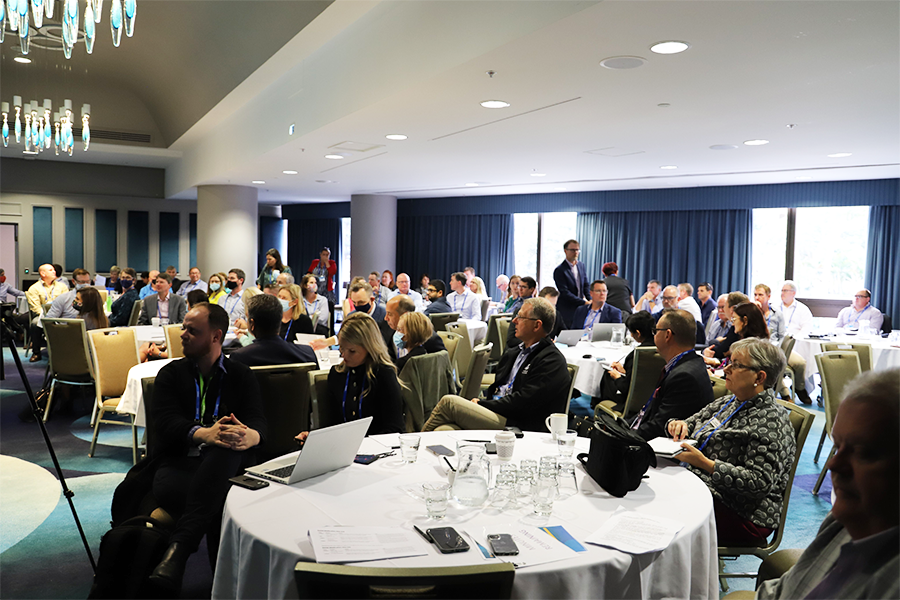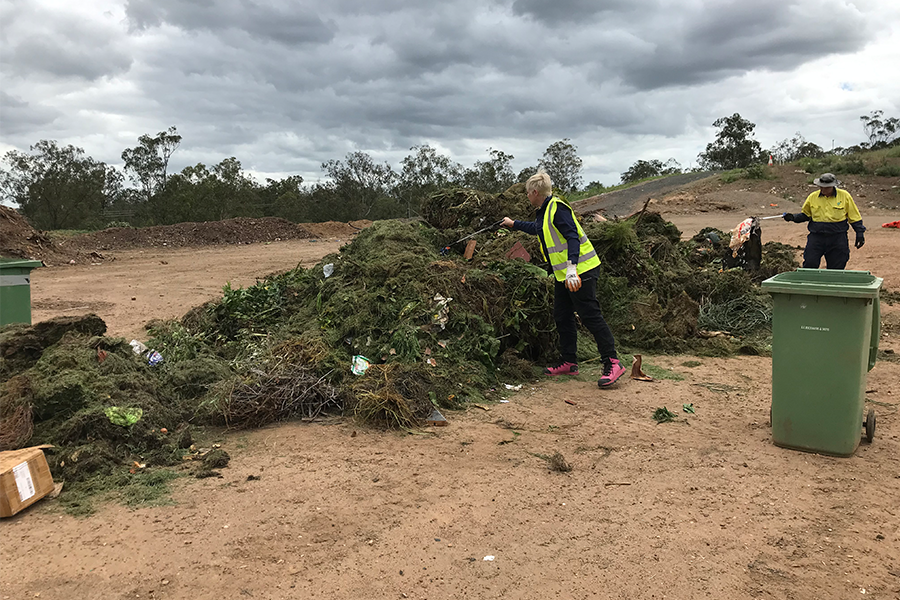By Rudolf Pretzler, LGAQ Policy Officer Waste and Public Health
Tuesday, 28 September 2021, 12:30PM—the sixth LGAQ Waste Forum commenced without a hitch. This would be a promising two-and-a-half days of insight and discussion into all things waste. As the new kid on the block, this was my first public event for local government and the atmosphere was full, owed to the combined will of those present, elected members and technical officers from across Queensland.

The crowd at the LGAQ Waste Forum
Everyone was focused on tackling the challenge of diverting more waste from landfill and achieving greater resource recovery. Among all the uncertainty on the future of waste levy impacts on local councils, one topic caught the attention and the imagination of the audience like no other—Food Organics, Garden Organics (FOGO).
Making up on average 50 per cent of the kerbside red-lid bin, organic material brings huge potential to deliver on state and national waste reduction and recycling targets.
The ability of having a third bin for households and quickly organising a composter outside of town sounds simple, right? At least that’s what most people think coming in with the notion of ‘why aren’t we doing this yet?’ In reality, FOGO comes with a suite of ‘what ifs’.
Organic Waste—the new frontier
At first, the novelty of organic source separation for most Queenslanders needs to be addressed. While this is common practice in the southern states, it also took them, on average, over a decade to reach the current ‘normality’ after sustained, multi-channel behaviour change and awareness programs. Next is location, location, location.
Looking at a map of Queensland, the solution that works for the southeast might not be appropriate for the regional and remote areas of the state. In acknowledgment of that, four councils across Queensland are trialling innovative ways in FOGO collection.
With trials running for 12 months, we can expect to explore all the good, the bad and the ugly and these experiences can then be shared with other councils.
With Townsville in the north, Rockhampton in central Queensland and Ipswich and Lockyer Valley in the southeast, a diverse range of climates, people and circumstances are part of this story already.

Sorting contamination at the Lockyer Valley FOGO trial
Council leadership
This brings me back to the LGAQ Waste Forum, which included a panel discussion on FOGO, hosted by the waste managers of these trial councils. No other presentation achieved such a level of engagement from the audience.
FOGO is clearly at the front of mind for many elected members and officials, and they want the best possible solution for their area. So what have we learnt?
1. FOGO can be incredibly effective at diverting mass from landfill.
To use the measurement coined by Lockyer Valley Regional Council, 1,000 of their residents could divert almost three elephants worth of organic material every week. That is 12 tonnes that can be recycled and returned to our soils, 12 tonnes that do not add methane emissions to our climate bill and 12 tonnes that do not occupy valuable landfill space. With 12 tonnes it is still relatively easy to remove contamination, mostly soft plastic. Any full-scale FOGO will need more sophisticated solutions against these contaminants.
2. FOGO is dependent on whole-of-community behaviour change.
Understanding FOGO can lead to misunderstanding. While a kitchen caddy on the kerbside is more amusing than troublesome, it speaks of the general confusion people have, and the need for education and awareness with recycling. The annual bin surveys of councils across the state have shown that 15 per cent of both the yellow and red lid bin contain what should be in the other. While contamination in the FOGO trials is much lower, it still heavily devalues the compost produced from it. Strategies and advocates often promise the waste revolution, however behaviour only changes on evolutionary terms.
3. FOGO opens up new market and career opportunities.
It is no secret in the business that resource recovery creates about three times the employment opportunities of landfill operations. An industry estimate states that each 10,000 tonnes of waste recycled equates to 9.2 FTEs 1 or in other words 6.4 more than what you get when landfilling. Coming back to the Lockyer Valley’s allegory, that is one job for every 272 elephants you avoid to landfill. If 1,000 Queenslanders divert 12 tonnes, imagine the size of the opportunity if all of Queensland gets on board. It’s a journey that Queenslanders need to be taken on, and we must get right.
4. FOGO is an individual adjustment.
Diverting more than 50 per cent of the current red-lid bin waste to the FOGO bin means less space needed, right? In theory yes, and trial councils are trying to encourage effective waste management by replacing bins with a smaller option. As Rockhampton has had to learn quite early on, this represents a change some people are not going to take easily. The Rockhampton team received 34 requests to revert the change back to the 240l bin, mostly from large or young families.
While that is just a mere seven per cent of all households trialled, seven per cent of all Queenslanders would mean a lot of resources, not only for bins but for recycling infrastructure, operations and monitoring. The need for sustainable funding sources becomes evident when there is ongoing questions regarding kitchen caddies, compostable bags or processing capacity in the region.
A way forward
When the LGAQ Waste Forum ended, and people went home to their corners of Queensland, the opportunities and challenges presented by FOGO stayed with them. It has certainly become clear quite early into the trials that there are a range of compliance issues that are easy to fix on the small trial scale, but will get tricky when full-scale FOGO is introduced. To find a way forward, councils will look for the findings of these trials, will look what is most accurate for their circumstances and will require significant and sustained financial support to make it work.
Any premature mandate from the state will only result in further contamination, frustration and unnecessary resources going to waste. The LGAQ Waste Forum has enhanced my knowledge and as a keen observer of what is to come, I look forward to more of the good and hopefully less of the bad and the ugly.
Rockhampton’s resident cartoonist probably sums up the benefits of doing this best when Queensland’s favourite bird, the ibis, says ‘Damn you FOGO’.
